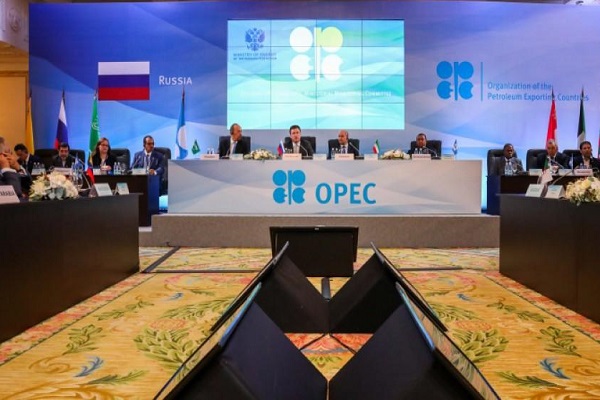Opec-Russia agreement falls apart, oil prices down 10pc
Sat 07 Mar 2020, 23:12:12

The Opec's plans for Organisation of Petroleum Exporting Countries (Opec) for deep and prolonged oil cuts were derailed on Friday as non-Opec Russia refused to support the move arguing that it was too early to predict the impact of a coronavirus outbreak on global energy demand, reported Reuters.
Failure to secure a deal between Opec, Russia and other members of an alliance known as Opec+, which has propped up oil prices since 2016, sent the price of benchmark crude into a tailspin, stated the report, citing sources.
Oil prices plunged 10 per cent as the development revived fears of a 2014 price crash, when Saudi Arabia and Russia fought for market share with US shale oil producers, which have never participated in output limiting pacts, stated the report.
"The deal is dead," one Opec source said.
Brent lost about a third of its value this year, tumbling towards $45 a barrel, its lowest since 2017, putting oil-dependent nations and many oil firms under heavy strain as the global economy reels due to the virus outbreak, which has dampened business activity and stopped people traveling.
"From April 1 neither Opec nor non-Opec have restrictions," Russian Energy Minister Alexander Novak told reporters after marathon talks at the Opec headquarters in Vienna on Friday.
The unraveling of the talks in Vienna also underscores the limited power of Opec to influence world energy markets, unlike its heyday in the 1970s. The US
recently became the world's biggest oil producer and keeps on pumping at full capacity, reported Associated Press.
recently became the world's biggest oil producer and keeps on pumping at full capacity, reported Associated Press.
The 14 Opec countries had wanted to cut output by 1.5 million barrels a day, or about 1.5% of world production. Opec countries like Saudi Arabia and Iran say they need non-member allies like Russia to take 500,000 barrels of that cut on themselves.
Russia, however, proved reluctant and Opec Secretary General Mohammed Barkindo of Nigeria said on Friday that the meeting had been adjourned.
“At the end of the day, there was the general painful decision of the joint conference to adjourn the meeting,” Barkindo said. He said informal talks would continue because the situation was urgent.
“The numbers are clear: The demand destruction is real,” he said.
Opec ministers had said on Thursday that the coronavirus outbreak created an "unprecedented situation" that demanded action, as measures to stop the virus spreading dampens global economic activity and oil demand, reported CNA.
They backed an additional 1.5 million barrels per day (bpd) of oil cuts until the end of 2020, equal to around 1.5 percent of global demand, a much bigger and more extended move than expected.
The ministers also called for extending existing Opec + cuts of 2.1 million bpd, meaning the proposed combined total of the cuts envisaged would have been 3.6 million bpd or about 3.6% of global supplies, it added.
No Comments For This Post, Be first to write a Comment.
Most viewed from International
Most viewed from World
AIMIM News
Latest Urdu News
Most Viewed
May 26, 2020
Do you think Canada-India relations will improve under New PM Mark Carney?
Latest Videos View All
Like Us
Home
About Us
Advertise With Us
All Polls
Epaper Archives
Privacy Policy
Contact Us
Download Etemaad App
© 2025 Etemaad Daily News, All Rights Reserved.

.jpg)
.jpg)
.jpg)






.jpg)


.jpg)
.jpg)
.jpg)
.jpg)
.jpg)
.jpg)
.jpg)
.jpg)
.jpg)
.jpg)
.jpg)
.jpg)

















